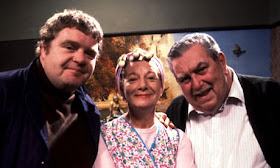Now Hilda had left Corrie 4 years before I was born, but as soon as I took an interest in Corrie, Hilda was one of the first faces I got to know from 'old Corrie'. She was easily identifiable - her curlers and headscarf, her singing, her gossiping, her 'muriel' and her flying ducks. And of course, her marriage to 'my Stan'. It is only through YouTube clips and DVDs that I've grown to appreciate Hilda as a soap legend.
 The Ogdens were introduced to the show in 1964. This year was a controversial one in the show's history. It had seen the first mass exodus of cast since it began in 1960 under the 'First Axeman' Tim Aspinall. While the likes of Martha Longhurst and Frank Barlow bid goodbye, enter the Ogdens at No.13. You could say they were the Battersbys of their day.
The Ogdens were introduced to the show in 1964. This year was a controversial one in the show's history. It had seen the first mass exodus of cast since it began in 1960 under the 'First Axeman' Tim Aspinall. While the likes of Martha Longhurst and Frank Barlow bid goodbye, enter the Ogdens at No.13. You could say they were the Battersbys of their day.Hilda secured a job as a cleaner at the Rovers and thus began a wonderful partnership between her and landlady Annie Walker that would last for nearly twenty years. Hilda's admiration for Annie and Annie's contempt and annoyance at Hilda were products of Corrie gold. And what was wonderful was the fact they never addressed each other by forename only - they were Mrs Walker and Mrs Ogden.
Her catfights were also legendary. I've watched clips countless times of Hilda's classic scraps with the likes of Elsie Tanner, Mrs Walker and Bet Lynch. She always gave good as she got. My mum always said when watching those clips that she remembers women doing exactly that in her home village.
When Bill Podmore became producer in 1976 he decided more humour was needed in Corrie and thus began Corrie's golden age for many. The Ogdens were pivotal to the success of the programme at the time, starring in memorable storylines like installing the 'muriel' in 1976, the seance and the second honeymoon in 1977, the chimney debacle in 1978, the hens in 1979 and various storylines involving Eddie Yeats between 1980 and 1983. When the golden age ended in 1984, it was no coincidence that it coincided with Stan's death.
 It was also an end to Hilda in 'classic Hilda' mode. The character softened as all her contemporaries had either died or left - Stan, Elsie, Annie, Len and Eddie. Nobody was interested in her tidbit gossip and her tut-tutting of Rita Fairclough living over the brush with Alan Bradley or Sally and Kevin having sex before marriage was seen as old-fashioned.
It was also an end to Hilda in 'classic Hilda' mode. The character softened as all her contemporaries had either died or left - Stan, Elsie, Annie, Len and Eddie. Nobody was interested in her tidbit gossip and her tut-tutting of Rita Fairclough living over the brush with Alan Bradley or Sally and Kevin having sex before marriage was seen as old-fashioned.When Hilda eventually left the street in 1987, it seemed a natural thing. It was indeed an end of an era. An end to an innocent time. When Hilda left, it seemed Corrie was allowed to change to mirror EastEnders and Brookside with sensational storylines like the Alan/Rita saga and Brian Tilsley's murder.
Corrie has never tried to have another Hilda on the street. Maybe a character like her wouldn't fit in anymore. She belonged to a classic Corrie era which we can look back fondly and rightly so.
Rest in peace, Jean Alexander. Thank you for creating not only a Corrie legend, but a TV legend. That's no mean feat and for that we are forever grateful.

NEW!
Coronation Street: The Official Colouring Book
Available now!
Please read our advice for leaving comments on the Coronation Street Blog
All original work on the Coronation Street Blog is covered by a Creative Commons License


